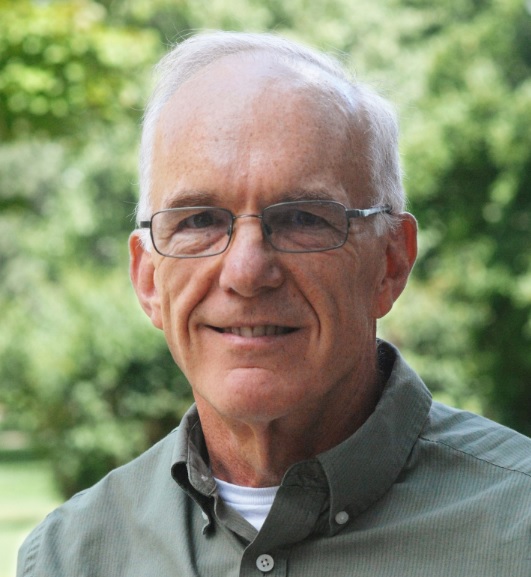
Dr. Luke Gascho is the executive director of Merry Lea Environmental Learning Center of Goshen College. He and his wife, Becky, live in Goshen, Indiana, and are members of Waterford Mennonite Church. He assisted in the founding of the Mennonite Creation Care Network and serves on the Anabaptist Coalition for Dismantling the Doctrine of Discovery.
Luke regularly studies, teaches and speaks on the concepts of creation care theology and ethics, leadership, ecological systems and the intersection of the three. He enjoys gardening, native landscaping, photography and woodworking as hobbies.
Being connected to the Mennonite Church is a stream that runs deeply through my life. My heritage has long roots in the Anabaptist tradition for which I am grateful. But my connection consists of much more than an ethnic, cultural and familial basis. While each of these elements plays a role in whom I am, I find the deepest connection in the life and teachings of Jesus Christ.
My early years of growing up in the woods of northern Minnesota provided a special place to be nurtured. The beauty and severity of the place stimulated learning about how to approach life. The small Mennonite mission church was a key context for my faith development. The congregation was a mix of people from the community and people with Anabaptist roots. The biblical narrative was communicated as framework for discerning how to live in the community and the world. It was clear that loving God, loving neighbors and loving the land should spring from our faith. The Sermon on the Mount was the touchstone for theological underpinnings, as well as the basis for life and practice.
I felt strongly valued, affirmed and connected to the Mennonite Church in this upbringing. I am grateful for the rootedness that took place in a setting where very few people knew about Mennonites. It was here that I made a deep commitment to follow Jesus from an Anabaptist perspective.
 My life journey has been informed by the core messages found in the good news of Jesus Christ. This good news is the basis for who we can be as a Mennonite denomination in the 21st Century.
My life journey has been informed by the core messages found in the good news of Jesus Christ. This good news is the basis for who we can be as a Mennonite denomination in the 21st Century.
The words of Jesus in Matthew 5:13-16 resonate with the way I’ve chosen to live my life, as well as being central to the actions we pursue as a church. I’m choosing three concepts from this passage as I reflect on my journey — and ponder a vision for a hope-filled future in the church. The words are light, salt and tenacity.
Light — You are the light of the world…
Light and love are wonderfully entwined. God is light and God is love. The universe is an expression of God’s love. Love is the core building block for all our relationships. I grieve the times when I “put a basket” over the light and love of God. This happens when I exclude people, when I disregard the value of all of creation and when I pursue inflation of self.
I have felt connected to the church in my career as a teacher and leader in Christian education settings. I spent 20 years leading a Christian school that included people from many denominational backgrounds. I am grateful the breadth of perspective and understanding this mix brought into my life. It was good to see how people with multiple theological views could work together for a common cause. We were committed to being Christ followers. We sought to be Christ’s light in that community.
I also reflect on how we covered the strong light through actions that were not framed in love. Human-based expectations were raised to the level of being spiritual mandates. Corresponding disciplinary actions were exclusionary and dehumanizing. I am committed to learning from these constricting patterns that weren’t light-filled and life-giving.
Salt — You are the salt of the earth…
God is a flavorful God! God is also a cleanser and healer. Salt represents these aspects of the Creator, Redeemer and Sustainer — and symbolizes our call to action.
For the last 20 years I have been leading and teaching at Merry Lea Environmental Learning Center of Goshen College. I have been inspired by the importance of caring for all of God’s creation. Being keepers of the earth is a way to share light — and the love of God — on a planet that has been severely impacted by destructive human activities. I believe we can be agents of regenerative processes that will heal our land.
Pursing care for creation is a major part of my understanding of the good news of Jesus Christ. It challenges our unchecked consumption of the earth’s resources.
I am committed to calling people to move away from the polarization of politics around environmental issues and instead to pursue caring for creation as a practice emerging from the gospel of Christ.
I also have been committed to being salt by understanding the power imbalances between people groups. I experienced the suppression of Indigenous Peoples as I grew up with half of my classmates in northern Minnesota being Ojibwa.
Other life observations have added to my awareness that the church has often limited our understanding of God to a Eurocentric view and thereby justified our dominance over people groups.
My leadership with Mennonite Creation Care Network and involvement with the Anabaptist Coalition for Dismantling the Doctrine of Discovery are ways that I have feel very connected to the Mennonite Church.
Tenacity — Let your light shine before people, so they can see the good things you do and praise your Father who is in heaven.
Surviving the harshness of the winters in northern Minnesota shaped a deep resolve in me to tackle hard challenges. I learned to enjoy the beauty of the winters — and I always remained hopeful because I knew that spring was coming!
I believe that we as a Mennonite church need to approach the future with hope — and a strong dose of tenacity. We need to be committed to each other — bonded by the love of God — believing we are bearers of the good news of Christ. As Anabaptists we are to be the incarnation of Christ for the world. We incorporate this into all we do as we pursue peace and justice — modeling the compelling love of God in our families, neighborhoods, world and even with our enemies. The Anabaptist voice is needed. The message will be multivoiced with a range of perspectives, understandings and passions.
As an avid home gardener and orchardist, I know the importance of the long-term view. I know that tenacity is needed in each season. It is with this understanding that I resonate with the following verse and chorus from Carrie Newcomer’s song, “You can do this hard thing.”
From the muddy ground
Comes a green volunteer
In a place we thought barren
New life appears
Morning will come whistling
Some comforting tune
For you
You can do this hard thing
You can do this hard thing
Its not easy I know,
But I believe that it’s so
You can do this hard thing.
I believe this will ring true as we delve into the Future Church Summit. Together we will see an unfolding of what it means to be followers of Christ in the 21st Century.

